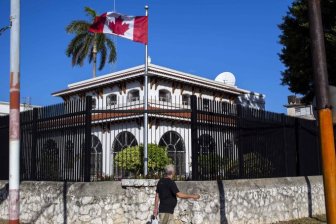Fuel contamination concerns continue to cloud Iqaluit’s drinking water. Here’s why – National | Globalnews.ca
The small city of Iqaluit is facing a water challenge again after traces of fuel were found in the Nunavut capital’s drinking water last week.
A precautionary boil water advisory issued Wednesday is in place and the city has shut down its water treatment plant because a breach in the system is suspected to have caused Iqaluit residents to smell fuel in their water.
Read more:
Iqaluit water crisis — City shuts down treatment plant due to fuel contamination
“It is definitely very concerning because there are many components in fuel that are toxic,” said Charles Q. Jia, a chemical engineering professor at the University of Toronto.
This is the second time in recent months that concerns have been raised around fuel contamination in the city’s water.
Iqaluit’s 8,000 residents were unable to consume their tap water for two months last fall after it was found to be contaminated with fuel. Throughout the emergency, the city continued to hand out bottled water to residents at different sites around the city.

The city has said an old underground fuel tank from 1962 buried next to the water treatment plant was the source of the previous contamination and residual traces of fuel entered the distribution system again last week.
The fuel tank was removed and deep cleaning was done of the bedrock in the void and areas below the water treatment plant. But Jia said that was not enough to solve the city’s problem.
He questioned why a fuel tank was built near the water treatment plant in the first place, calling it a “wrong decision.”
“The underground land, soil and the structure has been contaminated so the fuel escaped beyond the tank. I think this is one of the reasons why this occurred again.”
Nunavut’s Department of Health said a do-not-consume order was not necessary at this time, because the levels of hydrocarbons identified are below the Health Canada Drinking Water Screening Value and considered safe for consumption.
“The government of Nunavut is working with the city of Iqaluit to assess contamination with regular sampling and consultation with city-hired engineers who are investigating the infrastructure,” Danarae Sommerville, a spokesperson for the territory’s Department of Health, told Global News in an email Friday.
Read more:
Iqaluit sets up filling station after fuel found in drinking water again
Under the city’s current boil water advisory, residents are urged to boil all water for one minute prior to consumption, cooking and brushing their teeth.
A multi-tank bypass was implemented Wednesday to reroute water around all concrete tanks in the water treatment plant.
“The use of the bypass means that the produced water is not passing through the sites of contamination in the water treatment plant, so there is no risk of continued contamination of newly treated water,” Sommerville said.
The water will still be treated using ultraviolet (UV) and chlorine disinfection “but it may smell and taste different than the usual treated water, and may have a slight discolouration,” the city said in a public service announcement.
Additional remediation and cleaning efforts are currently underway at the water treatment plant.
But Jia said it would be “very difficult” to keep the water clean using the existing facility.
He said the city will probably need to build a new system and scrap the current plant to prevent further contamination – but it won’t be an easy fix, Jia warned.
“Because there is already leakage of fuel into the underground structures, I don’t think there’s an easy solution,” he said, adding that cleaning out the fuel from underground is an “extremely challenging task.”
A concrete reservoir specialist team was set to arrive in Iqaluit to complete a detailed assessment of all water treatment plant tanks and make recommendations that may include specialized tank lining systems, or other solutions as required, Stephanie Clark, a city spokesperson, told Global News on Friday.
— with files from The Canadian Press.
© 2022 Global News, a division of Corus Entertainment Inc.
For all the latest Health News Click Here
For the latest news and updates, follow us on Google News.




